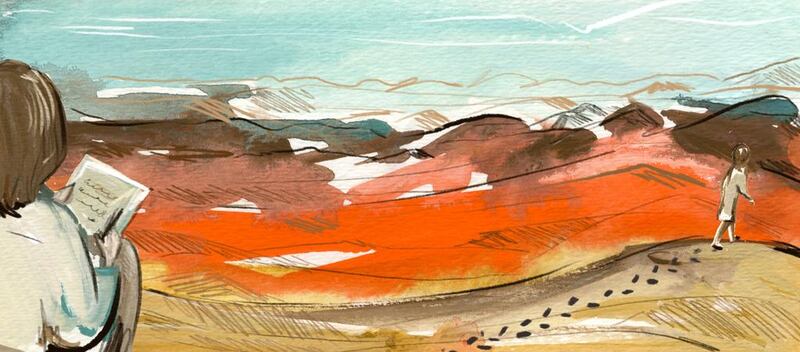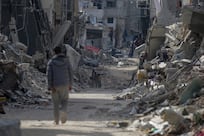The two-lane E65 demands your full attention as drivers race towards you, headlights flashing in urgency, demanding you move into the hard shoulder to allow them to overtake the lumbering lorries making for industrial sites. Once you turn off the road, just past the oasis town of Hameem, and up the 7-kilometre driveway that leads to the crenellated gates of the resort, however, and it’s a different story. As the ribbon of road undulates and curves to follow the rise and fall of rose-pink sands, it’s impossible to look straight ahead – snakes of black tyre tracks also bear witness to the captivating power of the desert.
May Menassa, one of two well-known authors mentoring a group of eight aspiring writers at a week-long creative workshop, or nadwa, organised annually by the International Prize for Arabic Fiction (IPAF), also feels its draw. “In my mind, the Empty Quarter is the city of the dead, but it is something else,” she tells me in a broken English that is far superior to my Arabic. “Every morning, I walk and I walk; I talk to myself and I ask myself, ‘Where am I? Who am I? The big question … you lose yourself. It’s like you are a grain of sand … you don’t know who you are.”
This, then, is the perfect setting for the nadwa during which eight writers from across the region – Hicham Benchaoui (Morocco), Nasrin Trabulsi (Syria), Abdullah Alobaid (Saudi Arabia), Ayman Otoom (Jordan), Samir Kacimi (Algeria), Noha Mahmoud (Egypt), Bushra Al-Maqtari (Yemen) and Lulwah al-Mansuri (UAE) – will bare their creative souls by reading excerpts from entirely new works or stories in progress.
This ad-hoc community has amazed and delighted Menassa, a Lebanese author who has written 10 novels set during her country’s long civil war. Everyone may speak the same language, she says, but every writer has a different accent and style of writing – and work that’s very different from the rest. Still, there are striking commonalities among the women, Menassa tells me with a mixture of wonder and empathy:
“The four women here, from Yemen, from Syria, from Emirates, from Egypt, they are quite different from each other but they are really the image of their country,” she says.
“They are not free. They are closed in their cocoon, but in the deepness of their thoughts, there is a woman who wants to live, to express herself.
“That is what I felt in every novel; I discovered a woman not very ‘new age’ but in the step of a new age.” Menassa describes this as a real revolution.
Her fellow mentor, novelist Mohammed Achaari, who is still waiting for his 2011 IPAF joint winner, The Arch and the Butterfly, to appear in English translation, is more circumspect when it comes to talk of revolutions.
“I have noticed in the nadwa that there is a return to personal life, maybe as a kind of reaction to the control of all these political events that crush the individual. So … it is like these events deny the individual and, through literature, there is way of a coming back for the individual.”
For one participant, 29-year-old Saudi writer, poet and stand-up comedian, Abdullah Alobaid, the workshop has crystallised his hopes of starting a second novel. The plot is a secret, but his fierce ambition to be widely read around the world is not: “I look forward to being recognised in the Western world,” he says. “I don’t want the language to be the barrier.”
cdight@thenational.ae





